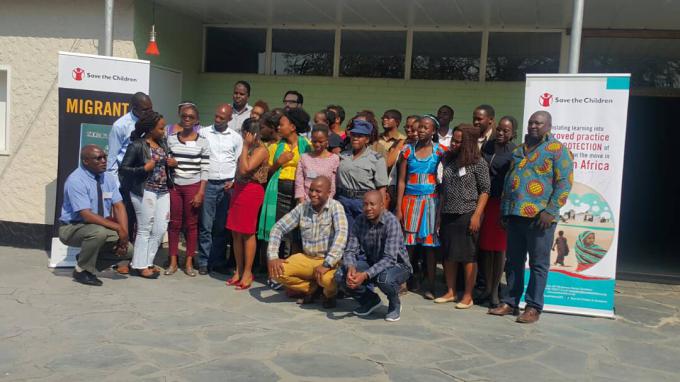Unaccompanied children deserve protection
Save the Children Zimbabwe hosted the regional Knowledge Exchange and Learning conference on unaccompanied migrant children, in Beitbridge town from 28 to 30 August 2017. The conference which was aimed at sharing and learning from country experiences in promoting the protection of separated and unaccompanied migrant children was attended by 38 representatives from countries in the Southern Africa region
 .
.
By Chido Katsiga
Save the Children Zimbabwe hosted the regional Knowledge Exchange and Learning conference on unaccompanied migrant children, in Beitbridge town from 28 to 30 August 2017. The conference which was aimed at sharing and learning from country experiences in promoting the protection of separated and unaccompanied migrant children was attended by 38 representatives from countries in the Southern Africa region. It was held under the theme, “Translating learning into improved practice for the protection of children on the move”.
As part of the conference, participants were taken on a field visit, which saw them visit Dite primary school and the Beitbridge Children’s Reception Centre where unaccompanied migrant children from different countries are received, after being intercepted at the border or during deportation.
Speaking at the Beitbridge Children’s Reception Centre, Joseph Tirivavi the Provincial Social Welfare Officer for Matebeleland South explained how unaccompanied children are intercepted and sent back to their families. “The border authorities bring the unaccompanied children to the Reception Centre, where they are housed and access services like counselling and health services while awaiting the process of tracing their families to be completed.Escorts that are funded by Save the Children help in tracing the families of the unaccompanied migrant children, accompany them to their families and later do some follow ups after the children’s reintegration with their families.”
From the Reception Centre, participants proceeded to Dite Primary School in Beitbridge District, where Save the Children Zimbabwe and its implementing partner Beitbridge Rural District Council (RDC), are implementing some income generating projects as part of the Children on the Move project. Proceeds from the projects are used in the payment of school levies for identified needy children in the community, who are at risk of irregular migration. Members of the Dite community spoke highly about the project, saying it has helped in keeping children in school.
Participants had the opportunity to hear country presentations from around Africa that highlighted innovative measures being taken to address the push factors for unaccompanied children’s migration and strategies to curb children’s irregular migration.
Notable among the presentations were lessons drawn from a South Sudan and Uganda study of unaccompanied Adolescent Girls on the Move between and within South Sudan and Uganda, family tracing and reunification, positive parenting to prevent migration and best cross border coordination practices to protect children on the move.
Commenting on one of the presentations Geoffrey Oyat, a representative from Uganda urged everyone to protect children on the move saying, “No one is deprived than a separated and unaccompanied child on the move hence they need to be protected within and outside their countries.”
The conference ended with participants discussing common a messages for use in advocating for the protection of unaccompanied migrant children. Clement Mhlanga, the Programmes Director of Save the Children Zimbabwe, encouraged everyone to apply lessons from the conference to transform practices for the protection of unaccompanied children.
Save the Children’s ongoing Children on the Move project is being implemented with the aim to promote the protection of separated and unaccompanied migrant children in the Southern Africa region following the rise in number of irregular migrant children in the region due to different political, economic and social factors.
 Zimbabwe
Zimbabwe